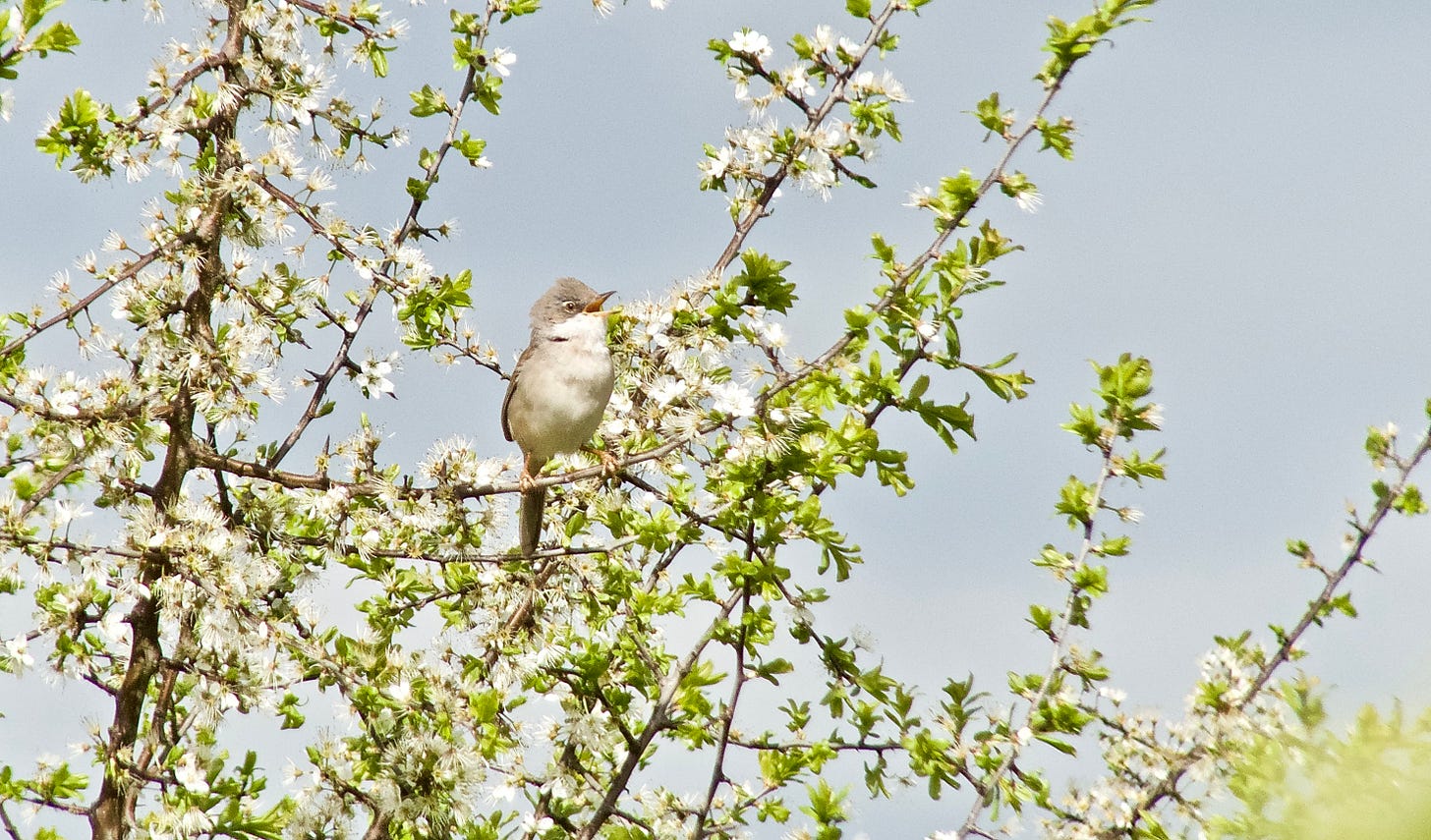7.23 pm. Kentish Town, north London.
I sense it as an undefined ripple in the continuum. Something, somewhere, is different.
I look up. Of course I do. It’s what I do in the last two weeks of April. Cause of death? Swifts. Or, to be more accurate, run over by a bus while looking for swifts.
The search, until now, has been fruitless. Not that there hasn’t been a wealth of other action to report. It’s that time of year, after all. The bird population of Britain, recently denuded by the departure of our winter visitors to their breeding grounds in the north, is replenished daily by arrivals from the south.
And what arrivals they are. I wang on relentlessly about swifts – it’s been my shtick for a few years now, and I’m not going to stop any time soon – but other birds are available.
Take the whitethroat.
You can see where it gets its name.
The whitethroat’s journey isn’t dissimilar to the swift’s. Wintering in sub-Saharan Africa, it makes its way northwards from early spring, arriving in Britain during April and May. If, that is, all goes well – and what with the dangers inherent in such a long journey, it’s a big ‘if’.
But while the swifts catch the attention with their trademark sickle shape, banshee squeals and frankly ridiculous speed and manoeuvrability, a whitethroat is relatively anonymous. Neither extravagantly colourful nor blessed with dramatic anatomical features or outlandish flying skills, it’s one of several members of the warbler group – among them sedge warbler, reed warbler, willow warbler, wood warbler, grasshopper warbler, garden warbler – to make the journey. (I apologise if all this repetition of the word ‘warbler’ is giving you a case of semantic satiation; blame the people who named birds back in the day).
All of these warblers (SORRY) are small, all of them are brownish, all of them arrive here relatively unheralded. Birders notice them, but birders work to a different calendar. They know the likely arrival date of all the migrants, the way a hardened cricket fan will be able to tell you months in advance when Hampshire will be playing Durham at the Rose Bowl in Division One of the County Championship (tomorrow, as it happens). These things go unnoticed by ordinary members of the public.
This is why, of all the people in Richmond Park last Tuesday, I was the only one (as far as I know) whose stride and pulse quickened at this sound, broadcast from a treetop near Pen Ponds.
I might be maligning my fellow Richmond-Park-ers. It’s just possible that the young lady who allowed her black Labrador to bound splashing into the pond – the one with the profusion of ‘KEEP YOUR DOG ON ITS LEAD AND ON NO ACCOUNT ALLOW IT TO CHASE WATERFOWL OR OTHER BIRDS YOU SELFISH PRICKS’ signs – did so because she was momentarily overwhelmed by emotion at the return of this understated bird. But I doubt it. Taking her time, she eventually realised that the kerfuffle on the water – coots and Canada geese making a hasty and panicked escape, not realising the interloper was ‘just being friendly’ – might just have been caused by her dog.
‘No! No! Stupid dog!’
I just stopped myself from the obvious rejoinder: ‘No! No! Stupid owner!’
I’m tempted to attribute my admirable reticence to the steely self-control for which I am famed across the globe. But really it was the whitethroat. Basking in the glory of its magnificent exuberance, I was, if only briefly, all perk and no pique.
But why? What is it about a nondescript bird singing a scrabbly song from a treetop that engenders such an uplift of spirits?
It is, simply, this.
It made it. It undertook that hazardous journey, across desert and sea, guided by instincts which we are beginning to understand more fully but which remain on the very outskirts of our ken. It flew and it flew and it flew. And after a few weeks of travel it reached that tree in Richmond Park and, not unnaturally, decided to shout about it.
Birds sing to advertise territory or to find a mate, we’re told. But perhaps there’s more to it than that. Perhaps this exuberant outpouring was simply a hoarse, exhausted shout of triumph.
‘I’m BAAAACCCCCKK! HELLO! LOOK! ME! No more than a scrap of a thing! Do you have any idea how far I’ve come? Six thousand kilometres! SIX! THOUSAND! And fuck me, you should have seen the traffic around Tripoli.’
I shout about the swifts. Of course I do. And I duly shouted about that fleeting Kentish Town sighting, which nearly delivered me to an untimely demise under the wheels of a Deliveroo bike. The first of the year is always special.
But let’s hear it for the whitethroat too.
Gull Boy
Thanks for reading this far. That might be quite enough birdy content for you, but if it isn’t, below the fold there are three recent bird-related stories I’ve really enjoyed. They concern pelicans, eider ducks and kiwis.
Keep reading with a 7-day free trial
Subscribe to Six Things to keep reading this post and get 7 days of free access to the full post archives.




